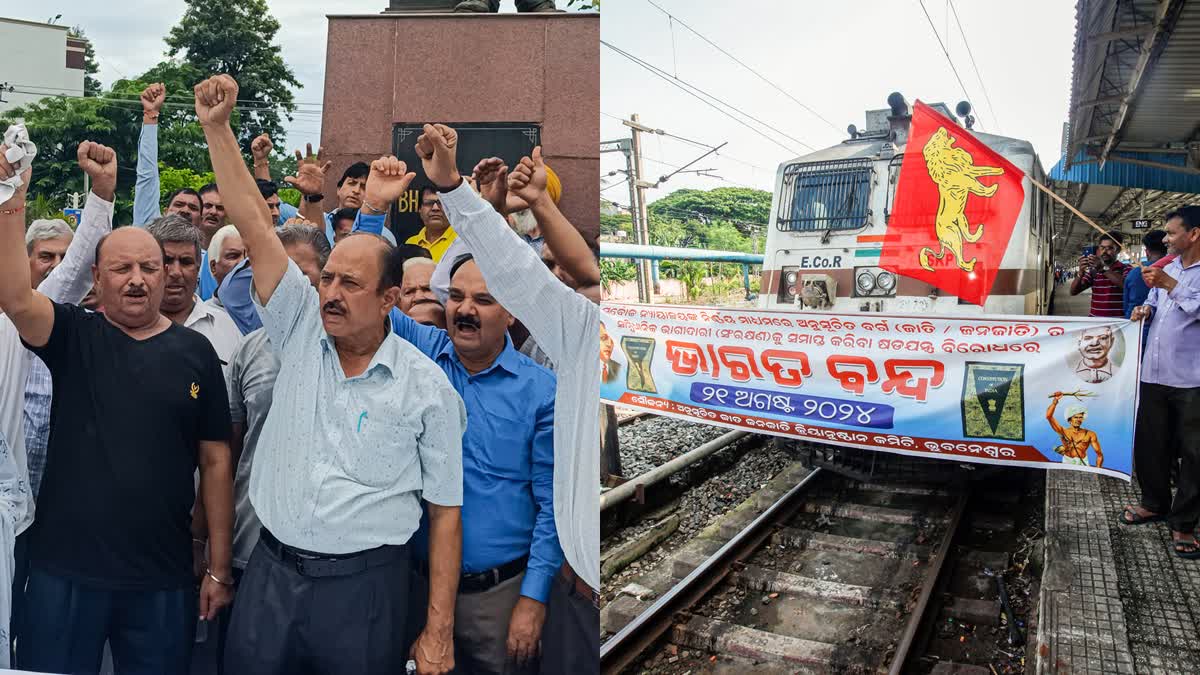Hyderabad: The nationwide Bharat Bandh on Wednesday called by Dalit and Adivasi organisations against the recent verdict by the Supreme Court over sub-categorization of quotas, evoked a mixed response with vehicular traffic briefly disrupted at some places by the protesters.
The bandh has called by organisations across the country have called for the Bharat Bandh against the Supreme Court's August 1 decision on the issue of SC-ST reservation. The organisations have opposed the verdict, contending that it will harm the basic principles of reservation.
Vehicular traffic was briefly disrupted in parts of Bihar on Wednesday, as protestors put up blockades in support of the Bharat Bandh called by some groups over community-based reservation.
While protesters disrupted train movement at Darbhanga and Buxar railway stations, police resorted to mild lathi-charge of protestors, who blocked movements of traffic on roads, including some national highways at several locations in Patna, Hajipur, Darbhanga, Jehanabad and Begusarai districts.
Sharswati Chandra, Chief Public Relations Officer (CPRO) of East Central Railway, said, "Protestors disrupted the movement of rail traffic at Ara, Chausa (Buxar), Darbhanga, Begusarai and Rajgir for some time in the morning. However, the situation was immediately brought under control and protestors were removed from railway tracks and stations. Now, the movement of trains is normal".
In Patna, police used mild lathi-charge to disperse protestors who blocked the movement of traffic at Dak Bungalow Chowk of the state capital. Talking to PTI, Rajeev Mishra, Senior Superintendent of Police (SSP), Patna, said, "Security personnel resorted to mild lathi-charge to disperse protestors who blocked movement of traffic at Dak Bungalow Chowk and later broke police barricade. No one was injured in the incident. Now the situation is completely under control."
Recruitment exams were held as per schedule for the post of constables in Bihar Police, Bihar Special Armed Police and other units in several districts on Wednesday. The state government had earlier instructed police to ensure the smooth transportation of aspirants to the test centres.
Traffic Briefly Disrupted
Vehicular traffic was briefly disrupted in parts of Bihar on Wednesday, as protestors put up blockades in support of the Bharat Bandh called by some groups over community-based reservation.
In Jehanabad district, agitators clashed with security personnel when they tried to block movement of traffic on National Highway-83, police said.
No Impact In Assam
The Bharat Bandh over community-based reservation had no impact in Assam on Wednesday. Schools, offices and business establishments functioned normally with almost full attendance across the state.
Vehicular traffic was normal and long-distance buses operated according to their schedules and there were no disruptions to railway services, with all trains running on time.
Mixed Response In Rajasthan
The Bharat Bandh against a recent Supreme Court order on reservation for Scheduled Castes (SCs) evoked a mixed response in Rajasthan, with normal life remaining largely unaffected.
While essential services have been kept out of the bandh, public transport remained unaffected in the morning. Shops and schools in some districts were closed. Mobile internet services are suspended in Bharatpur due to the bandh call. In some areas, people faced inconvenience as fewer roadway buses were available.
Police Advisory
Jaipur Police Commissioner Biju George Joseph issued an advisory for the maintenance of law and order in all police station areas of the commissionerate.
The Rajasthan State Road Transport Corporation (RSRTC) has issued orders for the safe operation of all its buses.
RSRTC Chairman and MD Shreya Guha said that in view of the Bharat Bandh, all chief managers, managing directors and traffic managers have been directed to remain present at the headquarters.
Partial Disruption In Odisha
The day-long Bharat bandh called by some Dalit and Adivasi groups to protest against the Supreme Court's recent verdict on the sub-classification of Scheduled Castes (SCs) partially affected rail and road communications in Odisha on Wednesday.
Government offices, banks, business establishments and educational institutions are functioning normally, police said.
The Home Department in a note on Tuesday, " .... advised officers and employees of various departments working in the state secretariat and heads of department building to reach the office by 9.30 am."
Here is the list of major national strikes in the country since 2010:
On August 17, 2024, doctors called for a nationwide strike, disrupting all non-emergency medical services across the country following the rape and murder of a trainee doctor at RG Kar Medical College and Hospital in Kolkata.
On January 8, 2020, members of 10 central trade unions across India were on a one-day nationwide strike to protest the "anti-workers" policies of the Centre.
On November 26, 2020, in one of the biggest nationwide strikes by workers, joined by protesting farmers in India, several states saw a complete shutdown. Over 25 crore workers across sectors participated in the strike, called by 10 central trade unions and hundreds of worker associations and federations.
On January 8 and 9, 2019, 15 crore workers went on strike. Ten trade union centres and several independent federations joined together for a general strike. Workers in manufacturing, mining, energy, transportation, banking, public services, construction and many other sectors took part, including many Industrial Global Union affiliates. For the first time, agricultural workers and farmers also called for a solidarity shutdown of rural India.
On September 2, 2016, a countrywide strike was called by 10 central trade unions and it was successful with the participation of almost 18 crore workers.
On September 2, 2015, normal life was affected in various parts of the country, as 10 central trade unions went on a day-long nationwide strike to protest against changes in labour laws and the privatisation of PSUs.
On February 20 and 21, 2013, the general strike called by Indian central trade unions received unprecedented support among workers across the country and it affected all vital sectors bringing life to a standstill.
On February 28, 2012, over 10 crore workers in India went on a strike for improvements in pay, pensions and employment rights.



